Beth Kephart's Blog, page 181
June 10, 2012
Dr. Radway's Sarsaparilla Resolvent: a fragment of an early sketch
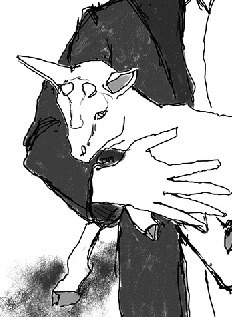
Dr. Radway's Sarsaparilla Resolvent, my 1871 prequel to Dangerous Neighbors, will (I'm happy to report) be illustrated by my husband. That makes this book our third collaboration. Bill illustrated my co-authored corporate fairytale Zenobia and took the majority of the photographs that appeared in my fifth memoir, Ghosts in the Garden. He began early sketches for this project more than a year ago, with this image.
I am especially happy about this collaboration, for I have long been mapping the rise of illustrated middle grade/YA books.
This is a fragment of the image that will most likely grace the cover of the book. William, who was introduced in Dangerous Neighbors as a boy who rescues lost animals for a living, is the star of this story. Early on in the story he decides to keep this unclaimed goat, whom he names Daisy and who travels with him on his varied adventures.
I can't wait to see this book come to life. I am especially eager to share it with Philadelphians who today walk the (much transformed) streets that William claims as his own.




Published on June 10, 2012 15:34
Why Be Happy When You Could Be Normal?/Jeanette Winterson: Reflections

People I respect and love were insisting: Read Jeanette Winterson's memoir. Tell me if you like it.
There was rarely a why attached to the insistence. There was only the fervor that arises from people who spend the bulk of their professional and personal time hunting for books that are extraordinary. We all read a lot, but how often do we find that book that keeps burning bright, days later? That book that we must share?
Why Be Happy When You Could Be Normal? is, in fact, that kind of book. It's the story, at first, of Mrs. Winterson, Jeanette's apocalyptic, domineering, supremely lonely and lonesome-making adoptive mother. Mrs. Winterson is a big woman among small people in a north England industrial town. She is a death dreamer and Bible reader, a fearless deliverer of obscenely unkind punishments, a practiced hypocrite. She figures large. She wields not just a metaphoric big stick but an actual revolver. She sets traps and insists on irreversible consequences.
Jeanette grows up with this. She finds her way to books. She's scrappy and wild and falls in love with girls. She makes her way, miraculously, until things fall apart, and love proves elusive. Late in life—after great success as an artist, after breakdowns big and small—Jeanette sets out to find her birth mother. Jeanette would like to know what real love is, and if she herself is capable not just of giving it, but receiving it, too. Her journey won't be binary. Her discoveries will not be pat. Any attempt to summarize any of this goes straight up against the honest search of the book.
But. This is a memoir about becoming a woman. This is equally a memoir about becoming a writer. It is episodic, philosophical, bitingly true. It passes no judgment, finally. It absolves us all.
One quote, from toward the end, that left me breathless. I leave the rest for you to discover:
But I wanted to be claimed.
I had styled myself as the Lone Ranger not Lassie. What I had to understand is that you can be a loner and want to be claimed. We're back to the complexity of life that isn't this thing or that thing—the boring old binary oppositions—it's both, held in balance. So simple to write. So hard to do/be.
And the people I have hurt, the mistakes I have made, the damage to myself and others, wasn't poor judgement; it was the place where love had hardened into loss.




Published on June 10, 2012 12:09
The Reading Promise: My Father and the Books We Shared/Alice Ozma: Reflections

We've grown accustomed to reading memoirs about bad parents. The subtle sleights and the overt abuse. The houses that were never homes. The cruddy meals. The mental blows. Seamy undersides and broken seams yield story. The make for hyper drama, page-turning gossip.
And yet it is redeeming to read the quiet tale, the sweet (but is it simple?) tale, of children loving parents who loved them back. And that's what we have in The Reading Promise: My Father and the Books We Shared. The book is, to quote Ozma, "about the act of reading, and the time spent doing it. The book is about the 3,218 nights my father and I spent reading anything and everything we could find. The books are important but the conversations they started, and the bonds they created, are what really matter."
It's a relationship book, then—far more than a book about particular books. It's a series of anecdotes and a defense of time spent kindly together. There's more dialogue in this book than one tends to expect in memoir (for it is difficult, of course, to remember precisely what was said). There's little tension between the daughter and the librarian-father who loves to read aloud. And while more might have been done to help us understand just what these many books taught or said, that was (again) never Ozma's purpose. She values her father. She thinks kindness counts. She wants, for other children, what she had with her dad—time together, time with books, time when the big world without is silenced in favor of the big worlds within.
Those are, I think, very fine want-able things.




Published on June 10, 2012 06:39
June 9, 2012
Preparing Dr. Radway's Sarsaparilla Resolvent for Publication
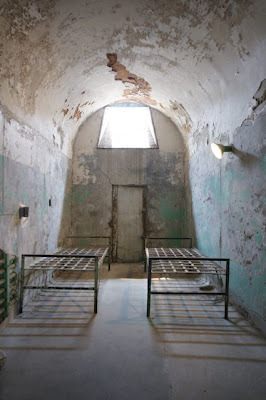
Less than a year from now, Dr. Radway's Sarsaparilla Resolvent, the 1871 prequel to Dangerous Neighbors, will make its way into the world. This is William's story; this is his world, Bush Hill. Look for more here on the particulars in a few weeks.
But before any book can go out into the world, it has to be a book we love. It had been a while since I'd read the "final" book through, and as I did (a few days ago) I felt uneasy. Work needed to be done. I wanted to do it. And so, today, my travels finally done, I am at work on the story—rebuilding its opening pages to heighten tension and momentum, deepening a character I named Career, and revisiting my notes on Eastern State Penitentiary, where much of the story takes place.
This is a photo of the room about which I write, taken a year or so ago.[image error]




Published on June 09, 2012 07:45
Character or Plot? Part 2 of the YA Roundtable with Elizabeth Mosier, Siobhan Vivian, and Melissa Walker

Part 2 of the Philadelphia Stories YA Roundtable continues here, as Elizabeth Mosier, Siobhan Vivian, Melissa Walker, and I talk about character, plot, and the advice we give to other writers. Our great thanks to Michelle Wittle!




Published on June 09, 2012 03:43
June 8, 2012
BEA Buzz Books: The Adult Titles. The Panelists Speak.

My final Publishing Perspectives story takes an inside look at four of the Buzz Authors of adult books—British actress and playwright Rachel Joyce (The Unlikely Pilgrimage of Harold Fry), Vaddey Ratner (In the Shadow of the Banyan), Susannah Cahalan (Brain on Fire: My Month of Madness), and Antoine Wilson (Panorama City). Facilitated by Beatrice's own Ron Hogan, the panelists reflected not just on what they write but how they hear the voices that carry their tales.
The whole story can be found here.




Published on June 08, 2012 14:06
Alice in Baker Street Recounts the Children's Book Conference

I am privileged, in my travels, to meet genuinely kind and interesting people—many of them much younger than me, all of them going places. Last week, at the Publishing Perspectives Conference held in New York City, I spoke with Jess Ferro, an undergraduate student and children's book lover who had traveled far to make the event and who made the very most of her Big Apple experience.
She's done a wonderful job of capturing the event here. It gives me great pleasure to introduce Jess and her blog, Alice in Baker Street. I suspect you'll want to make her musing place a favorite of yours.




Published on June 08, 2012 03:43
June 7, 2012
a diagnosis, at last
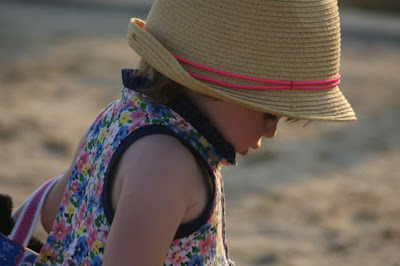
After more than six weeks of acute pain and terrible fatigue, after many holes in my arms and too many tests, the doctor has called with an explanation of what has gone wrong with my body. It seems utterly curable, but it will take a while (specialists must be seen, things must be verified, before I can start on any course of treatment).
I am just so grateful, tonight, for a probable answer. And I am especially grateful for the quilt that arrived here on Monday, from my dear friend Wendy Robards, who must have known, all those months ago, that I would need her goddess comfort.
Oh, how I have been blessed by her goddess comfort. As I am blessed by all of you.
Thank you for putting up with me all these weeks. I plan to soon return to full fighting form.




Published on June 07, 2012 15:51
Not Chasing Trends, Making Them: My Publishing Perspectives Story on the BEA's Buzz YA Authors
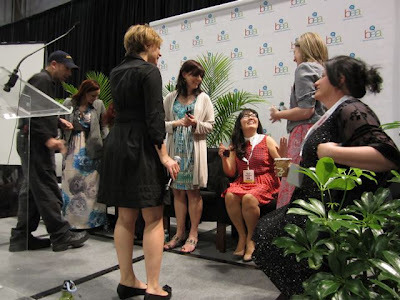
In a wall-to-wall session at the BEA, the season's top YA authors—Melissa Marr, Tonya Hurley, Siobhan Vivian, Jenny Han, Elizabeth Norris, and Bethany Griffin—gathered to talk about trendmaking, book writing, and teen readers.
I covered the story for Publishing Perspectives here.




Published on June 07, 2012 03:37
June 6, 2012
Kristi Yamaguchi Talks With Jennifer Brown at the BEA
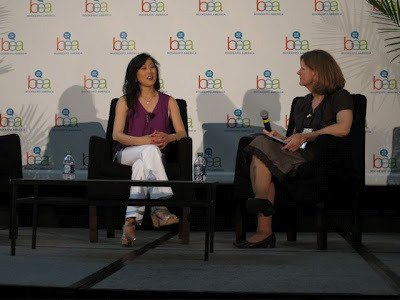
When I mentioned to friends that I had seen Kristi Yamaguchi at the BEA, I heard a collective sigh. Yamaguchi is that kind of loved—a talented athlete, a dedicated artist, a philanthropist, a wife, a mother, the sort of celebrity one hears only good things about. I had grown up figure skating, which means I had grown up watching Kristi. And when she danced with Mark on Dancing With the Stars, I—a lover of ballroom dance (if not precisely a ballroom dancer)—watched with special fervency.
The tremendous Jennifer Brown, the children's book editor for Shelf Awareness and a very dear soul, had the honor of interviewing Kristi at the BEA about Kristi's second Poppy book. I was on hand to write the story for Publishing Perspectives. You can find the piece here.




Published on June 06, 2012 17:18



